Ruthi Postow Birch's Blog, page 11
April 29, 2019
The Lessons I Learned On a Steamy Summer Day When There Was Nothing Else to Do
It was a sticky-hot Alabama afternoon. I was nine years old and there was nothing to do. Mama and Daddy couldn’t take me swimming because they had to work. My friends weren’t home. I didn’t even have Grandmama because Aunt Pauline had taken her to get a permanent wave.
I tried roller-skating, but I’d lost my skate key, so the skates kept pulling apart and making me fall down.
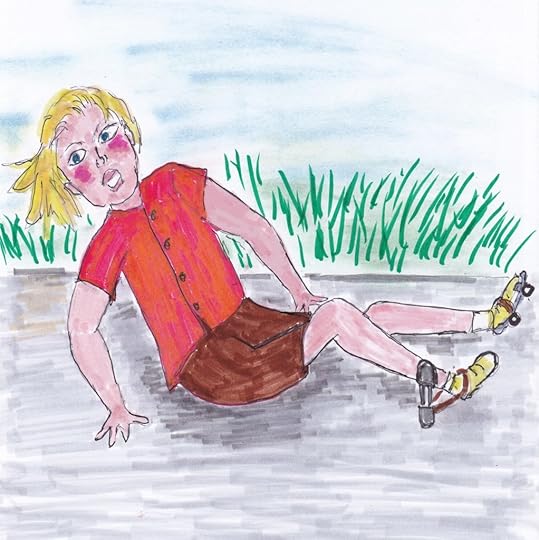
Then the skates would fly around and hit my ankle. I limped down Petain Street, stopped by the barber shop for a piece of bubble gum, and went to Smith’s store, where I watched the butcher cut meat for a while. Then I headed home, sulking.
An old lady had just moved into the lopsided shotgun house that perched, unsteadily, over the ditch. When I passed, she waved at me and called out hello.
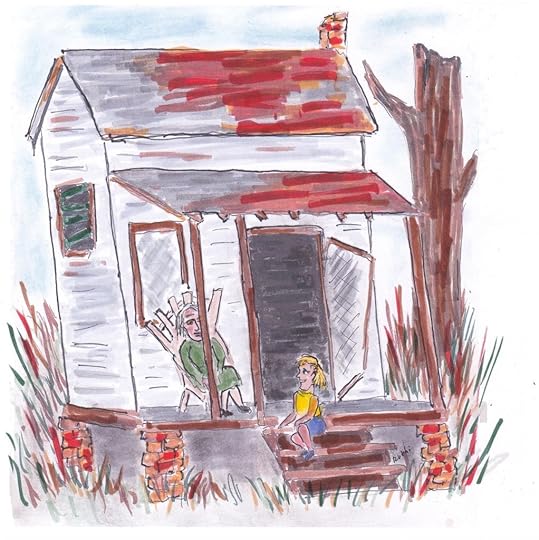
There was nothing else to do, so I went up, sat on her rickety front steps. She said her name was Dottie Stone. I asked where she was from, though I didn’t expect her to be all that entertaining. What a surprise I got!
She told me she had come from Chicago. Wow! I’d never met anybody from Chicago before. The way she described it, I could hear the wind whistling through the tall buildings and the horns blowing, and I could see the lake she said was as big as an ocean.
I stayed there listening to her stories all afternoon, occasionally peppering them with exclamations of, “Wow!” “Really?” and, “You’re kidding!” (I almost said that when she told me she had been pretty when she was a girl, but I didn’t.)
Nobody I knew had ever done the things she had. She told me there were dance places in Chicago, and she had gone dancing in them, and men paid to dance with her. I said, “Really?” and she said, “Yes.” And went on to more stories.
She told me her friend had a tattoo and dared her to get one – and she did it! Daddy had a tattoo, but it was different back then. No lady I’d ever met had a tattoo. I said, “You’re kidding!” No, she wasn’t. She took off her shoe and showed it to me – a butterfly right on the top of her foot. “Wow!” Then she told me how they did it – with needles. “Really?” and I knew I’d never get one.
In what seemed to be no time at all, it was suppertime. I was pretty much a blabber-mouth back then, but that day, all I said were those three words- really, wow, and you’re kidding. I figured they must be magic words, because whenever I said one, she’d tell me another story and get more animated with each one. That lady really liked to tell her stories.
Once school started back in the fall, I learned that there are lots of people in the world who are just as full of stories as Mrs. Stone, and just as eager to tell them when they’re urged on by the magic words.
We had a school fundraiser, selling boxes of birthday and all-occasion cards. I spent afternoons knocking on our neighbors’ doors, and I learned nobody wanted all-occasion cards, but a lot of people wanted to tell stories. When I just talked about the cards and held them up, people might be polite enough to glance at them, tell me they were nice, then not buy them.
But when I asked a question about their lives, I’d end up sitting, for maybe an hour, on a porch swing or a chair with crocheted doilies on the arms while they looked through the cards, oohed and ahhed at pictures of flower baskets, or puppies, or Christmas trees in snow, and told me their stories.
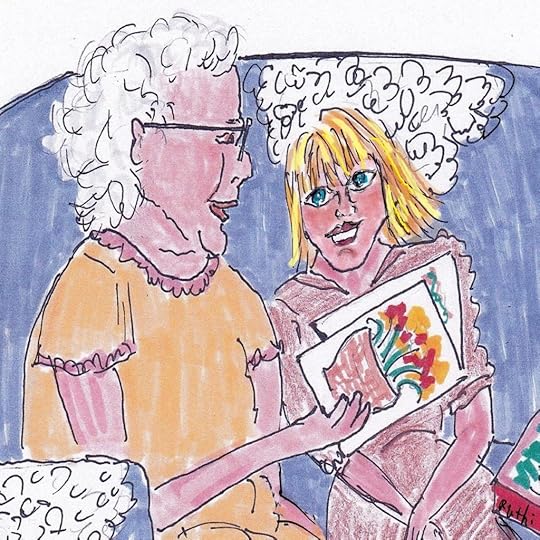
At the end, almost all of them bought a box, even two, and I heard some great stories! “Wow!” I listened and they bought my cards.
I learned the secret to selling cards – start with a question to get them started, then the magic words would keep them going.
My friend Elizabeth told me I was doing it all wrong. She was in my class and was selling cards too. I told her about listening to the stories, and she said I was wasting time. I was supposed to stand at the door, show the cards, get the two dollars for a box, and go to more houses. But I didn’t care what she thought. Maybe sitting and listening to people tell stories wasn’t her kind of selling, but I liked going in their houses, and I liked listening to the stories.
So what if I didn’t sell right? So what if she said I wasted time, I thought, wasting time on people with stories to tell me was good.
Not everybody I visited bought, but all my cards got sold and I had to get more boxes! Elizabeth didn’t have to get more boxes.
The moral is: If you want people to buy your all-occasion cards, let them know you’re interested in them. And if the other guy is interesting, you’re having more fun.
The post The Lessons I Learned On a Steamy Summer Day When There Was Nothing Else to Do appeared first on How To Build A Piano Bench.
April 9, 2019
When You Work with People, You’ve Gotta Laugh
It was the middle of the night and something was ringing, ringing, ringing. At first, Sam thought it was his alarm clock. He slammed his hand on the snooze button. The ringing didn’t stop. He cursed and hit it again. The fog on his brain lifted enough for him to realize it was the phone. At this hour, a phone call never brought good news!
He answered and a voice he didn’t recognize said, “Is this Mr. Granger, the human resources manager of Qwerty Company?”
“Yes. Who is this? Has something happened?”
“Mr. Granger, this is Jim Thomas. Last week you interviewed me for a job in your company. I have a problem, and I called to ask you, if you hire me, can I get an advance on my salary?”
~
Sam got to work at eight, carrying his fourth cup of coffee, almost enough to make him feel up to tackling his day.
But there wasn’t enough coffee in the world to make him feel up to a confrontation with Hazel, the office busybody this morning. Helen was marching toward him, her face full of purpose and self-righteousness. He ran and ducked into the men’s room, but that didn’t deter her. She was waited him out. She had her tale to tattle, and wasn’t leaving till it was done.
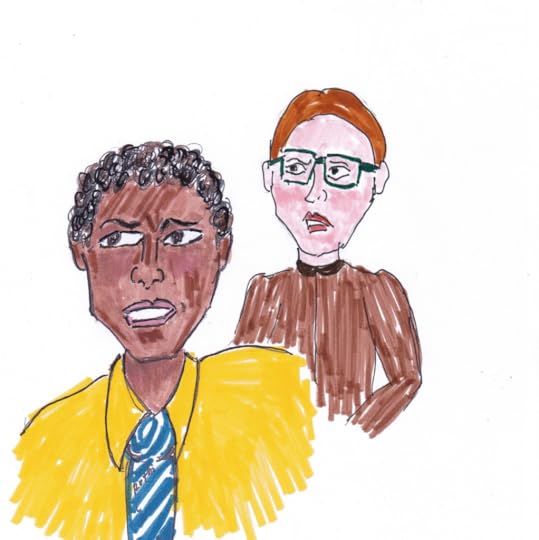
“Sam, you have a serious problem! It’s the janitor. I’ve been keeping my eye on him. I was almost sure he was slacking off. So I tested him. Every night last week I dropped a couple pieces of paper behind the trash can in the garage. At least half the time, he did not pick up the paper. He’s clearly not doing his job! You need to discipline him!”
Sam thanked her for her diligence, then stopped by the kitchen for aspirin. There he ran into Marie, the vice president of marketing, whose assistant he had just replaced.
“Sam, I meant to stop by your office later to talk about my new assistant. The good news is she is so much faster than Betty was. She can make 5 mistakes in the time it took Betty to make just one.”
Marie sure had a better sense of humor than Helen.
Sam went to his office and closed the door. He had emails to answer. But first he had to delete the dozen spam mails that offered sex aids, and the one from a helpful fellow who said he found mistakes on the company website and offered to correct them, if Sam would just send the passwords. After the spam, came complaints.
“Someone ate my apple! You need to send out an email telling people not to eat other people’s food.” “My computer is too slow and tech won’t return my calls. You have to do something about them.” “I’m the only person in the company who ever has to relieve the receptionist. I think you should assign the executive assistants turns at the front desk.
*It was from George, the office support person and backup receptionist.
~
There was a knock on the door. It was a happy employee coming to thank him for his good work. (Just kidding!) It was a sobbing executive assistant, tears and mascara running down her face.
“My boss told me if I didn’t have something intelligent to say to never speak to her again. Then she mumbled behind my back, ‘I’ll enjoy the everlasting silence.’ She hates me!”
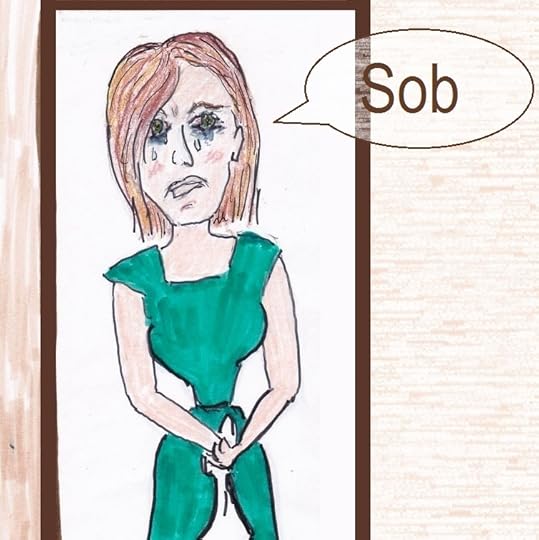
He consoled her and made a note to counsel the boss, and it was time for lunch. Sam took a walk. He had to come back because he had two candidates scheduled to interview for a job supporting the company’s attorneys.
Both candidates had good resumes, and the first interview started strong. Then, the candidate explained why he left his last job as legal secretary in a law firm.
“It was the pressure. There were strict deadlines. It stresses me out when I have strict deadlines.”
Oh, well. He still had the second candidate. She had brought evidence to prove her qualifications.
“I have great organizational skills. I organized my closet by types of clothing, purpose, and color. Here. Look at this. I took a picture with my iPhone to show you! See?”
It’s true, he thought. Attorneys always need a good organizer, but he wondered if a neat closet would impress them.
Sam went home, laughing all the way.
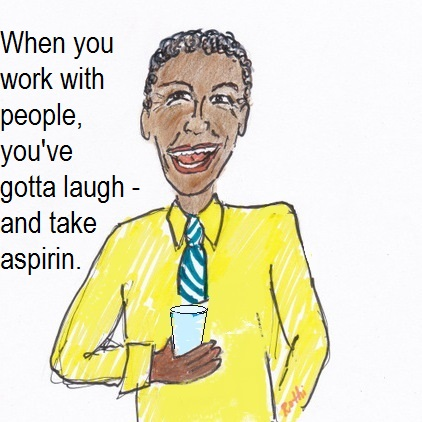
The post When You Work with People, You’ve Gotta Laugh appeared first on How To Build A Piano Bench.
March 19, 2019
A Blond Walked Into the Fairhope 5 and 10 Looking For a Job…
I found Mr. Walker, the store owner, and told him I wanted a job. He gave me an application – my first – and told me to fill it out. It didn’t take long because I only had the one job to write about – my three Saturdays in the grocery store.
When Mr. Walker looked at the application, he frowned and looked up at me.
“This was your only job?”
I answered, “Uh-huh.”
“Is this right? You were there only three days?”
“Uh-huh.”
“Why did you stop?”
I explained.
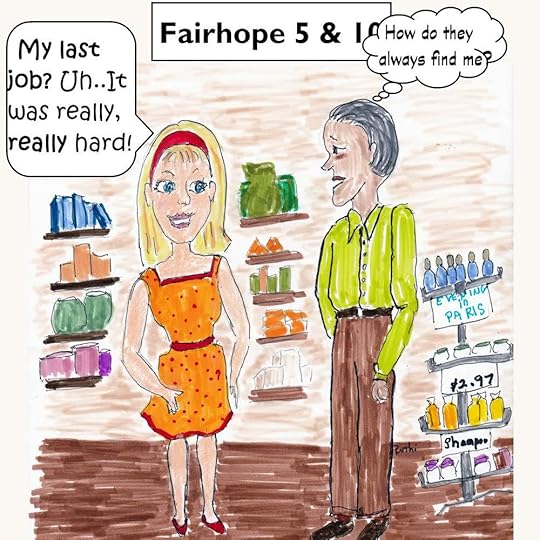
“It was awful. When you don’t hit all the right buttons on the cash register, you have to start over. And it takes a lot of time when you have to do a whole cart full of groceries over. And I was supposed to remember the prices for beans, and carrots, and parsnips, all at the same time. It was hard to remember anything when the line of customers was getting longer and longer. And I didn’t even know what a parsnip was.”
I gave him my brightest smile. “But I’ll be better at this job because you don’t sell vegetables.”
I didn’t even get past the front door, that is, I failed the interview.
I went home fighting off the fear of failure and wishing I had some Mallomars.
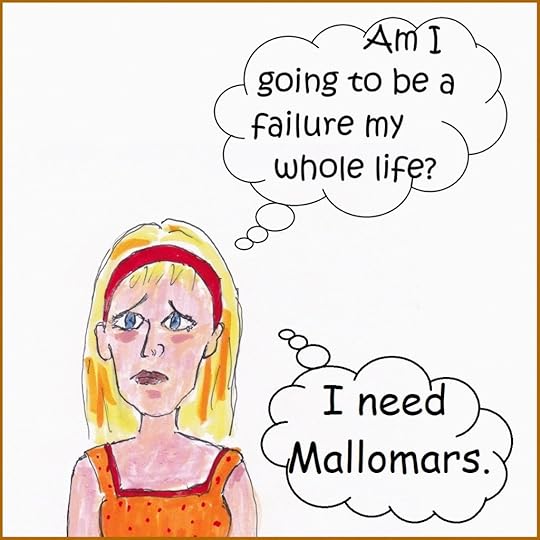
They were hard experiences. But after giving it thought, I realized they taught me three valuable lessons and helped me narrow down my career choices.
When you’re on an interview, you don’t need to express all of your feelings.
You shouldn’t use the fact that you failed on one job as the reason you would succeed on another.
My path to success lay in a career that didn’t require the ability to memorize the price of parsnips.
(And they complain about millennials!)
The post A Blond Walked Into the Fairhope 5 and 10 Looking For a Job… appeared first on How To Build A Piano Bench.
March 7, 2019
My Adventures with Grandma
Grandma was the best playmate I ever had. She turned even the most boring day into an adventure – like the times we were stuck in the backseat of the car for hours on car trips with my parents. Riding down endless country roads to visit kinfolks, it didn’t take long for me to start whining and complaining,
“This is boring.”
Suddenly, Grandma would sit forward, point at a lonely shack by the side of the road, and in a voice filled with excitement say, “Look! That little house is just the thing for us. Let’s fix it up and live there, just the two of us. We’ll play games all the time, and there’ll be nobody to tell us what to do, what to eat, or when to go to bed. Now, let’s see, what will we need? Hmmm,” she’d pause and I’d jump in with, “a bed, and a table.”
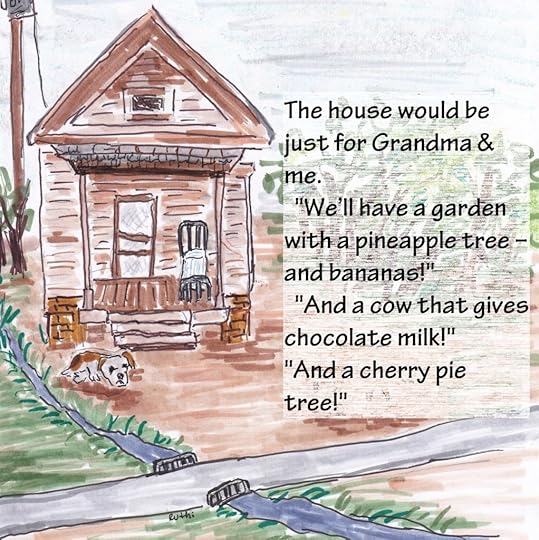
The miles would fly by as Grandma and I furnished our house–a woodstove to cook and keep us warm, two chairs, a dresser, a lamp. We’d have a TV to watch whatever shows we wanted, and we’d never watch the news. Of course, I added a horse–I always added the horse.
“We’ll need a garden,” Grandma added. “What will we grow?” And we would giggle and toss out a wild array of delicious, far-fetched edibles to funny, to silly, to silliest. A pineapple tree–and bananas! A caramel sauce creek! A field of popcorn stalks! A cow that gives chocolate milk! A cherry pie tree! We’ll have a pineapple tree – and bananas! A cow that gives chocolate milk! A cherry pie tree!
Finally, our giggles tapering off, I would lean back in her arms. But the trip wasn’t over. It was time to sing. Grandma knew songs that nobody else knew. “Johnny Wants a Pair of Skates,” or “Billie Boy,” and “William A. Trimbletoes.” We’d sing, at the top of our voices,
~William A. Trimbletoes
he’s a good fisherman
catches hens
puts em in the pins
Some lays eggs
Some lays none
liar liar limber lock
three geese in a flock
one flew east,
one flew west,
one flew over the cuckoo’s nest
O U T spells out~
Grandma lived with us in a room Daddy built especially for her. That room was a treasure chest filled with eighty-five years worth of things to entertain a child. There were albums with pictures, old and new, of family members I’d never even met, and there was a story to go with each picture. There was one brown picture from way, way back when Grandma was a little girl. Grandma told me traveling photographers used to come by the farms and take pictures. The sweet-faced old lady in a sun-bonnet was my Great-Grandma Thomas, a sweet-faced old lady in a sun bonnet, and right beside her was a cute little spotted pig.
“Why did they take a picture of a pig?” I asked.
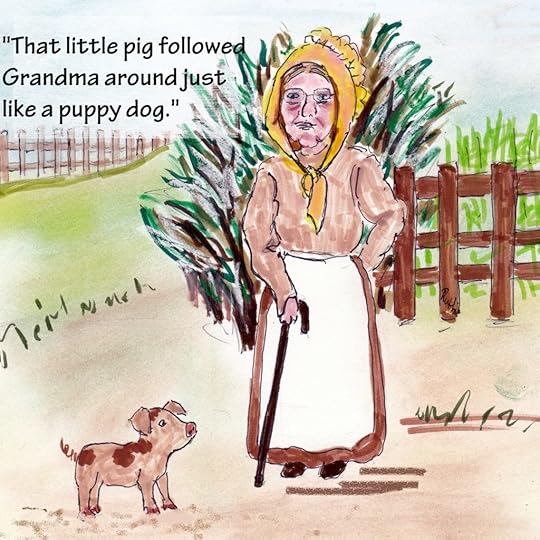
“Oh, that little fellow just loved Grandma Thomas. It followed her around everywhere, just like a puppy dog,” she laughed. “It was the funniest sight. They tried to shoo it away for the picture, but it wouldn’t go.”
“What happened to the pig?” I wanted to know. Grandma looked at me as though it was a silly question, and answered, “We ate it, of course.”
On rainy days, I’d go to her room, and out would come her button box with its hundreds of buttons in every shape, material, and color.
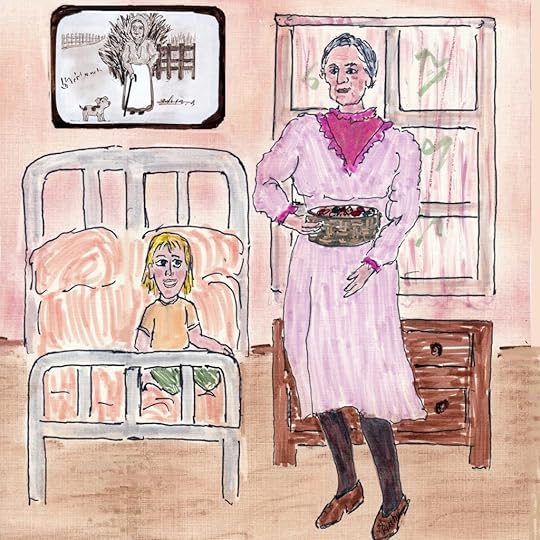
She would thread a needle for me, and I’d sit on her bed for hours, stringing buttons, while she told me stories about when she was a little girl; the time she ran a boarding house and the people she met, or how she met Papa.
On sunny days we might walk up to Smith’s grocery store on the corner for a dime’s worth of penny candy, or take the bus to Prichard and go to Kress’s Five and Ten, where she bought me my very first Sundae.
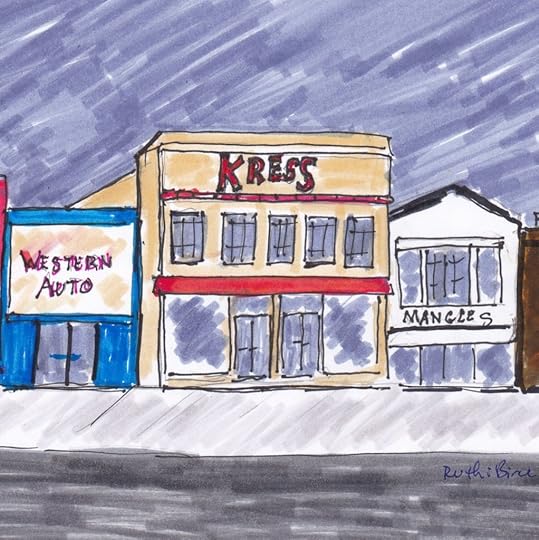
But when I was bad…Grandma had her own way of dealing with a naughty child. She knew a very scary man by the name of Mr. Jack Dobie, and when one of us children was bad she would summon him to come and take us away to . .
I don’t know where, but it surely wasn’t a good place.
When she’d had enough of my bad temper or rambunctiousness, or however I was behaving, I’d hear Grandma call out, “Come get Ruthi, Jack Dobie. She’s being bad. Come on and get her.”
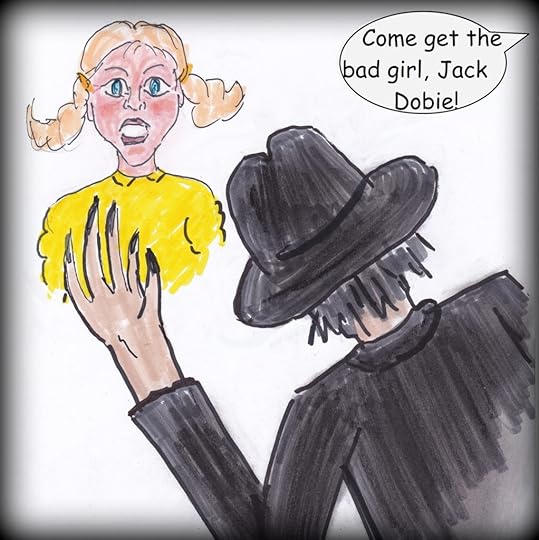
And I’d grab her arm giggling and screaming, “No! Don’t call him! I won’t be bad anymore – not ever. I promise.” Or I’d run to the one place in the house where I knew I was safe from him, Grandma’s bed. I’d jump in and hide my head under her pillow, and yell out, “He can’t find me here, so tell him not to come.” Being scared has never been so delicious.
I don’t know if he took away any other children in the family (I always hoped he’d take my mean cousin Polly), but Jack Dobie never came for me. After some begging and promising to be good, Grandma would always decide I was salvageable, and say, “Well, all right this time. I suppose you’re worth keeping, but don’t be bad anymore.” Then she would call out, “Jack Dobie, never mind coming today. Ruthi’s sorry.” And we’d be on to our next adventure.
Do you have favorite games and adventures with your grandma? I’d love to learn about them.
The post My Adventures with Grandma appeared first on How To Build A Piano Bench.
February 15, 2019
Heroic Women and Tidal Waves
This is Susan B. Anthony Day. I decided to look her up online to find out what qualities made her heroic enough to have her own day. Halfway through reading about her, I was reminded of another heroic woman, my mama, not that you’d see any resemblance just to look at them.
Short and plump with a sweet face, brown eyes that laughed, and a quick, sometimes mischievous smile, Mama didn’t appear to be in the same league with a woman who was a force that changed the world. Maybe not the world, but Mama was force enough to change things in her little corner of it.
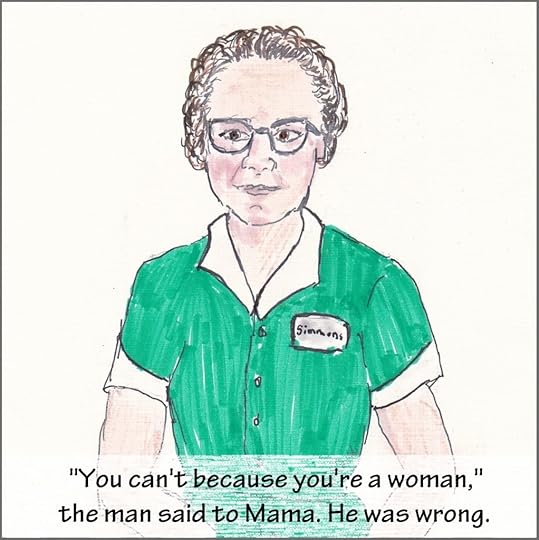
I looked up bios of other exceptional women to see what qualities they shared. Three things jumped out at me. They had principles they believed in with unwavering certainty. They had an intense sense of fairness. And they had the courage to stand up for their values and against injustice.
Susan B. Anthony was rock solid in her belief in equality for all people, saw the inequities in the system, and stood up.
She recognized the evils of slavery, and she took action, lecturing and campaigning for its abolition. She knew women deserved to be equal to men, but without the right to vote, she knew there was no equality. She spoke up, organized campaigns, lectured, and started petitions. She even committed a crime for her belief – she voted. Arrested, tried, found guilty, and fined, she didn’t waver or accept the judgment. She also never paid the fine. Lawbreaking in pursuit of justice was a righteous act.
Rosa Parks was another heroic and courageous woman who faced unjust laws.
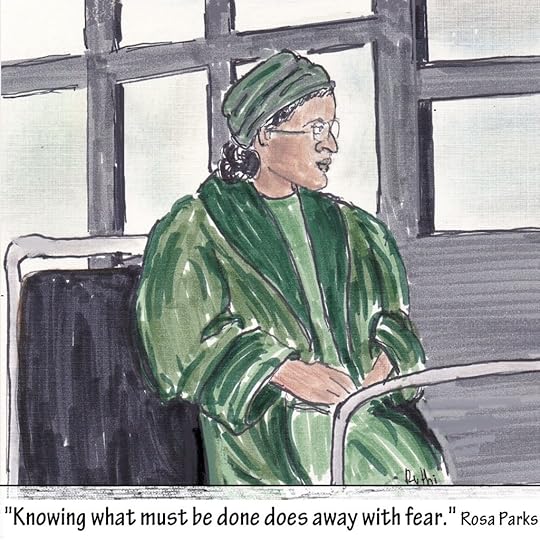
As an African American, equality was denied to her by law. Then, on a bus in Selma, Alabama, she quietly took a stand, or a seat, against one of the laws. She was ordered to get up and give up her seat to a white rider, but she didn’t move. She sat, she was arrested, and she started a wave of change.
“People always said that I didn’t give up my seat because I was tired, but that isn’t true. I was not tired physically, or no more tired than I usually was at the end of a working day. I was not old, although some people have an image of me as being old then. I was forty-two. No, the only tired I was, was tired of giving in.”
Mama was never famous or as powerful as these women, but she was heroic. Her voice was smaller but she raised it and made a difference. She believed in equal rights for all people, she hated injustice, and she was fearless in standing up to anybody.
Mama was head cashier in a grocery store. She loved her profession, but she knew the wages were unfair. The wages for grocery clerks in the south were the lowest in the country at less than ninety cents an hour for a five and a half day week. “It’s not right,” she said, and went to work, meeting with union organizers, buttonholing other workers to convince them to join the union as the only way to improve conditions and get fair wages.
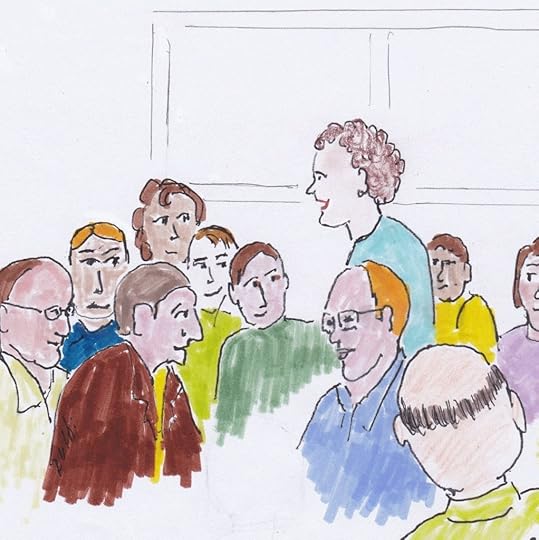
She carried a sign and walked a picket line during a short-lived strike. By the time she retired, the Retail Clerks Union represented most of the checkers and stockers in the Mobile county.
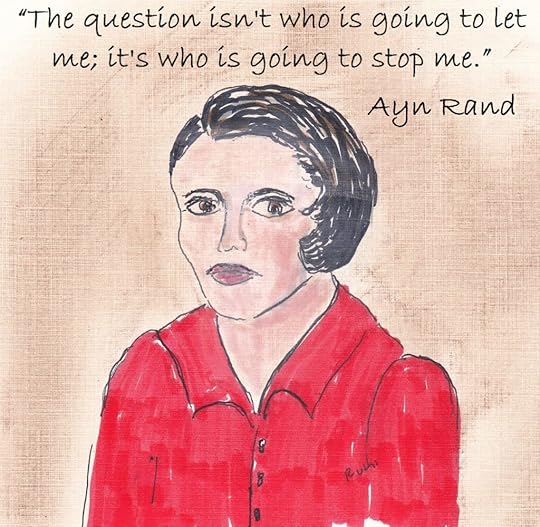
“You can’t because you’re a woman.” Mama didn’t believe that.
The manager of the J. C. Penney’s store thought he could tell Mama, “You can’t.” He was wrong. This was in the 1950s before the credit card explosion, and department store charge cards were just becoming popular. Mama decided she wanted one. She filled out the credit forms in her own name, writing Daddy’s name in the blank for “spouse.” When her card came, the name on it read Mr. N. G. Simmons. She put me in the car and drove straight to the store where she confronted the manager.
“This is my credit card and that is not my name.”
“You can’t have a credit card in your name,” he argued in a tone that might have seemed polite if it weren’t also snooty. “Your card has to be in the husband’s name. It’s the policy.”
She smiled but sparks flew from her eyes. “If I have a card, it certainly does not have to be in any name but mine, and it will not. I have a job, I earn my own money, and I pay my own bills. My husband did not apply for your card. I did. My name will be the one on it, or you can take it right back. I can shop here, or I can drive right past your store and go to Sears and Roebuck in Mobile. So you can either keep your credit or give me a card with my name on it.”
J.C. Penny must have changed the policy, because Mama got her card.
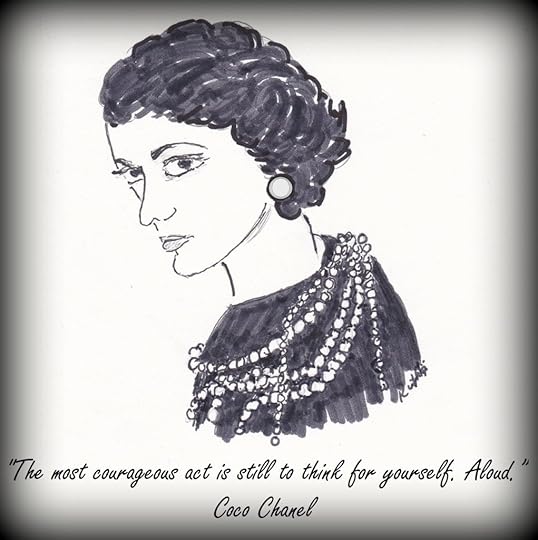
Some heroic women are world leaders and some are grocery store clerks. Whoever they are, they think for themselves and inspire other women to think, they refuse to be pushed out of the way, and they act. They have something else in common. Heroic women start change. Sometimes it just amounts to a trickle, but sometimes they start tidal waves.
The post Heroic Women and Tidal Waves appeared first on How To Build A Piano Bench.
February 5, 2019
A Lesson I Wish I Hadn’t Had to Learn
When I was a little kid, I thought my Daddy was something special. He was a tugboat captain. It was a much more exciting job than the other daddies’ jobs. One day the teacher asked us to stand up and say what our daddies did. I raised my hand and waved it to go first and tell them how my Daddy, the tugboat captain, ran boats all around the Gulf Coast to Texas and even on the ocean all the way up to New York City.
But when I was nine, Daddy quit being a tugboat captain. He took a job called air compressor operator at Brookley Air Force base in Mobile. Air compressor operator wasn’t a job I wanted to brag about, especially since I never understood what it was anyway. I knew Daddy’s job wasn’t special anymore, but I didn’t tell him.
The day I shamed Daddy was supposed to be fun. He picked me up from school to take me to buy school shoes at JCPenney. Then we were going to Kress’s for a sundae. But first he said he had to go to downtown Mobile because he had to meet a banker at the Merchant’s Bank. I was afraid we’d run out of time for the sundae. I whined and asked why we had to go meet some old banker. Daddy said, “I’m opening an account with that bank and I want to know the man who banks my money.”
It was my first time in a bank and I thought it looked like a palace. The room was bigger than a church, and fancier than any church I’d seen, with silvery floors, walls painted with pale blue rainbows, and a round ceiling that looked like a night sky full of stars.
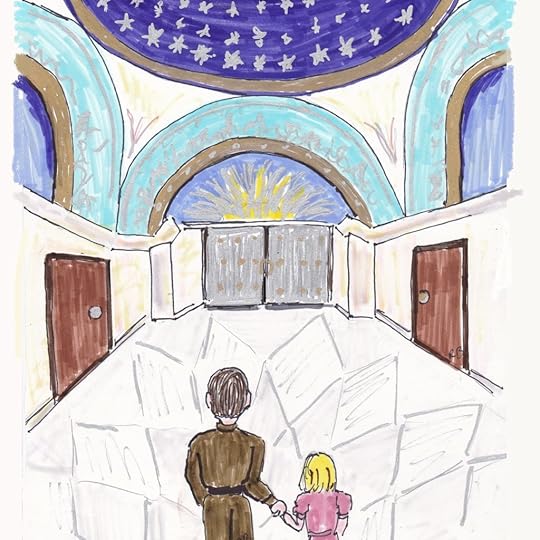
The banker, Mr. Dyson, came out, shook Daddy’s hand, and took us into his office where Daddy sat down beside his big desk. I looked around the office and at the banker. I knew he was important in his fine blue suit, starched snow white shirt, and tie. Suddenly I looked at Daddy, and saw his green khaki shirt and pants, and I was embarrassed.
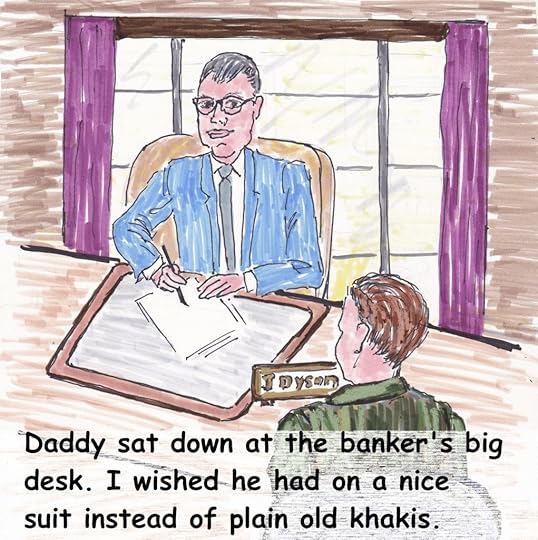
I didn’t say much on the drive to JCPenney. I was still thinking about how Mr. Dyson looked and wishing Daddy didn’t have on his old khakis.
The shoes I wanted were penny loafers. Daddy bought them and put pennies in the slots. Then he said he wanted to stop in the men’s department so he could get some clothes. I was excited. Maybe he saw that he wasn’t dressed as nice as Mr. Dyson too. Maybe he would buy a suit. But he walked right past racks of men’s pants, dark suits, bright white shirts, and ties in all colors. I pointed at them, but he went to the shelf with the same khakis, picked up a shirt and pair of pants.
While he was paying the salesman, I blurted out, “Daddy, why do you have to always wear khakis instead of nice clothes. Why don’t you get a suit and white shirt like Mr. Dyson at the bank?”
“Hush!” he said, and finished paying the salesman. I saw his face. His jaw was set and his mouth was a straight line. I knew I was in trouble.
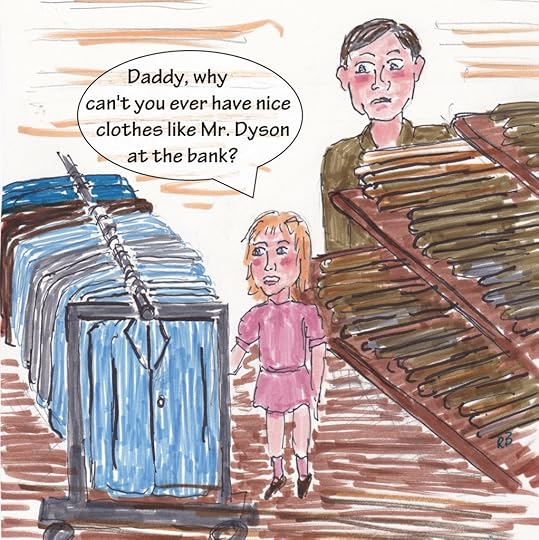
As we walked out of the store, I wished I could run away or disappear. We headed to the car instead of going into Kress’s. He didn’t turn on the engine, just sat there, quiet, for what seemed forever. It would have been better if he’d yelled. Finally he said in a calm voice.
“I’m going to tell you something important and I need you to pay attention.”
I started to say I was sorry, but he put his hand up to quiet me. “I know we don’t have as much as some people. No, we don’t. And I don’t dress in fancy suits. But that’s all right. I’m not ashamed. Hear me. You can’t be shamed by the cost of your clothes if they’re the best you can do and they’re clean and neat. Why, I’d sooner trust a man in clean overalls than one in a dirty suit.”
I stared down at my lap, ashamed and sad that I’d embarrassed Daddy in front of the salesman and hurt him. My face felt red hot and I wanted to cry. But Daddy wasn’t finished, “Look at me. I want you to remember this. Always be proud of who you are. Don’t try to be something you’re not. It never works.
“I do an honest job. My clothes are the right things to wear to work for the work I do. It would be just as wrong for me to go to work dressed like Mr. Dyson, in a suit and tie, as it would be for Mr. Dyson to wear this. If I wore a suit I couldn’t work for fear I’d get diesel fuel or oil on it. The men I work with would think I was putting on airs. If Mr. Dyson wore khakis, I wouldn’t trust him to bank my money.”
Even now I cringe a little when I think about how I shamed Daddy. But I learned something that day about pride and dignity. Daddy was a proud man.
He knew who he was, and whatever clothes he had, he wore with dignity.
The post A Lesson I Wish I Hadn’t Had to Learn appeared first on How To Build A Piano Bench.
January 22, 2019
Uncle Rufus’s Whiskers and Other Stories the Old Folks Told
The old folks in our family were more proud of being part Cherokee than just about anything else – even though we probably weren’t. Whenever we got together, they told stories about heroic Cherokee leaders and the white men who stole their land.
Every summer, homecoming brought the family back to Meat Camp, a near ghost-community near Brewton, Alabama, where my great grandparents had farmed. From all over Alabama, Georgia, and the Florida Panhandle they came, with blankets, benches, lawn chairs, coolers, and baskets filled with everything that was ever good to eat.
The roughhewn and weatherworn table, four times the length of Uncle Eb’s pickup truck, was crowded with jugs of sweet tea and lemonade, bowls, pans, and platters of food – fried chicken, two or three hams, fried fish, snap peas, turnip greens, collards, salads, banana pudding, apple turnovers, and every kind of cake and pie you can name. Mama’s fried chicken was always the first to go because her chicken was the best in the country. Everybody said so.
I was nine, and Daddy was right about one thing, even though I got mad when he said it – my eyes were bigger than my stomach. But what child wouldn’t be seduced by such a spectacle? I loaded chicken and dumplings, ham, potato salad, fried okra, and creamed corn onto my plate, and sat under the oaks where I would be able to eat less than half of it.
I listened to the grownups talk, mostly, it seemed to me, about who was sick or dying, having marriage trouble, or a new baby. I was bored until Uncle Eb said, “We’re part Cherokee on Grandpa Thomas’s side. His granddaddy was half Cherokee – his mama was full-blooded. He had a decent-sized farm up in North Carolina, near Gastonia as I understand it, though we don’t know for sure. But he was well off.
“Then,” Uncle Eb paused to make sure everyone was paying attention before he went on in a dramatic voice, “a white man tried to steal his land. There was a fight and our great granddaddy killed him. Of course, the law took the white man’s side and went after him. He had to leave his farm in the dead of night. That’s how we came to live in Alabama. He moved down here where his daddy had family, married a white woman, and lived the rest of his life as a white man.”
I was part Cherokee! That was something to brag about. I told the kids at school. Then, right in front of everybody, Jimmy Baker said it wasn’t true, because, “you have yellow hair and blue eyes. That proves you’re not any part Indian. I should know, because we really are Indian. My daddy and I both have black hair and eyes. That proves it.”
Facing the kids, in my almost too-white skin and my dishwater-blond hair, my face burned red. I knew he was wrong, but I was scared he was right.
I had to wait till the next family gathering to learn the truth. When I told them what Jimmy Baker had said, Grandmama’s pale eyes shot sparks. She snapped out, “Pshaw! I know those Bakers and they are no more Cherokee than I’m a rooster. Black hair, my foot! That boy’s Daddy may have hair black as tar, but his beard’s red and bushy as the whitest man’s on earth. Everybody knows Indians don’t have chin whiskers at all and they for sure don’t have red ones.”
Uncle Tup chimed in, “It’s been some generations, but you can still see the Cherokee in some of us. Look your Uncle Rufus. He’s never had to shave a day in his life. The most whiskers he ever had at once were two or three.”
Daddy put down his sweet tea. “I remember when I was a boy. Uncle Rufus would get dressed up for church, then he’d rub his chin. Any few whiskers there, he’d pull out while he walked and be clean as a whistle by the time he got to the church house.”
I was reassured of my heritage. Uncle Rufus’s whiskers proved I was part Cherokee!
From that day on I accepted my Cherokee ancestry as true, until my cousin mailed away one of those DNA tests kits. The thing declared us to be just plain, ordinary Europeans. It shook me at first, but after giving it some thought, maybe it’s wrong. It’s hard to dispute Uncle Rufus’s whiskers.
The post Uncle Rufus’s Whiskers and Other Stories the Old Folks Told appeared first on How To Build A Piano Bench.
January 2, 2019
To Be Happy, Her Dad Said, A Girl Must Be Pretty, But Not Fat
To give the man the credit he was due, he just wanted his daughter to be happy, and he knew what it took for a girl to be happy. She had to be pretty, and that meant not fat. She also had to have money, and that meant she had to get an education so she could take care of herself, because a girl couldn’t count on a man.
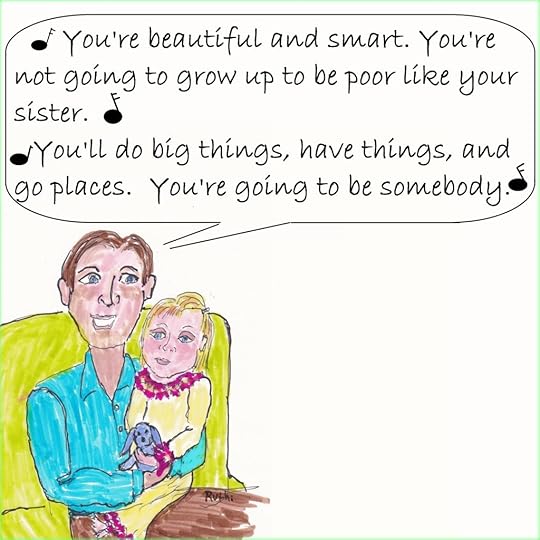
Wanting this for his girl, he set about to help her achieve those goals the best way he knew how. And that is why she hated him.
The man had two daughters, born seventeen years apart. He had wanted the same good things for both of them, but he knew he had failed with the first girl. So, when the second girl came along, he knew what he had to do. He started early and threw every bit of his energy into raising this baby right. The baby was a pretty child, so he could focus his efforts on preparing her to make money. “When you get big,” he crooned to her, “you’ll do big things, have things, and go places. You’re going to be somebody.”
To warn her of the dangers of failure, he used the example of the older daughter, called Sister. “It’s a shame and disgrace what your sister did to herself. She was the prettiest girl in town, and she could have amounted to something. But she’s never done a thing with her life. I did the best I could. I put her in college. Then she quit and ran off to be in the army. I washed my hands of her.” That made Baby both sad and scared. She loved Sister. Everybody did. Sister was happy and fun to be with, but she was poor.
“You’re not going to be like your sister, married to some man with no education, living hand-to-mouth. She’s had to come to me to borrow money for groceries and rent. If she’d just listened to me…. But you won’t be in her shoes. You’ll never have to depend on a man – even if you got a good man, he might die. You’ll be able to stand on your own two feet.” Yes, she decided, she would get her education. She wouldn’t be like Sister. She didn’t want Daddy to wash his hands of her too someday.
Along with motivators and warnings, the man raised his little girl on heaping helpings of praise. “You’re pretty as a picture and you’re smart as a whip! You can do anything you ever want.” He beamed with satisfaction when someone said, “Just look at those blue eyes. Your daughter is beautiful.”
As the girl got older and more independent, the man started seeing danger signs that she might be getting off track, and he worked to reel her in. “Stop running around, playing, like you don’t have good sense. Read a book. Learn something.”
Her favorite game was making up scenes and acting them out. When he overheard, he made fun of her. “Folks may think you’re crazy for talking to yourself. But they’ll know you’re crazy if you answer.” He walked away laughing at his joke, and repeated it to her uncle.
As her friends started to have more influence, he worried. “Those girls don’t have any more ambition than to get married and have a bunch of babies. They’ll be old by the time they’re thirty. Drop them. They won’t do you any good. Hang around people who are going to matter.”
Then, when Baby reached her preteen years, something seriously concerning happened. She started to put on weight. The man couldn’t let her do that to herself. “You’re getting chunky. You need to get some exercise. Stop sitting on the couch all day drawing those silly pictures.”
The man knew he was doing the right thing for her. He saw how unhappy fat girls were. He pointed out a girl who lived on their street, Venie Frasier. “She’s so fat,” he said, “she had to stop school when she was nine because she couldn’t fit into a desk. And it’s a shame too because she has a pretty face with skin as smooth as milk.”
Venie was a fine motivator. When Baby reached for a piece of candy, he said, “Why, here’s Venie, stuffing her face with candy.”
At a family dinner, when Baby asked for a second helping of banana pudding, he said, “Okay, Venie, help yourself. But don’t blame me when you’re big as a horse.” He turned to her uncle and said, “Oh, well. At least she’s got her Mama’s complexion.”
She got off the couch and exercised. He should have liked that, but she bumped a table, and he said, “You flit around like a baby elephant. Stop it and act like a lady.” Baby was afraid she would never be rich and thin and pretty.
When she was in high school, she finally lost the weight. She grew up, went to college, and moved far away from home. Driven by the fear that she would never look good enough, be graceful enough, or successful enough, she worked hard, made a lot of money, and bought a big house.
Sometimes she sent the man pictures of her big house and the places she traveled, so he could show his friends what he’d accomplished. The man had just wanted his daughter to be happy, and he had known what it took for a girl to be happy. He had done his job well.
The post To Be Happy, Her Dad Said, A Girl Must Be Pretty, But Not Fat appeared first on How To Build A Piano Bench.
December 18, 2018
Aunt Pauline’s Stylish Christmas Tree
said Aunt Pauline as she hung another long strand of tinsel on the fir tree in her living room. I was eight years old, and in a scene that still comes to my mind every year when I open my boxes of glass ornaments to decorate my Christmas tree.
My aunt had flair starting with her bright red hair that was always perfectly styled. “When you have red hair, you can never let it go. It’s the first thing people will see.”
She never did anything ordinary. At Easter time, no plain blue, pink, and yellow Easter eggs for her! In her hands, the same PAAS dyes the rest of us used to make plain one-color eggs, turned out eggs that were stripped, speckled, and polka-dotted. But they were only preludes to her annual masterpiece, her Christmas tree.
The year I was finally big enough to help her decorate the tree, I jumped out of bed, gulped breakfast, and skipped to her house. Her living room was filled with the aroma of the balsam fir that stood almost to the ceiling, and was surrounded by boxes of colored ornaments. She let me unwrap and hang the glass balls, making sure I mixed the colors and spaced them for best effect. With the balls of color hung on the branches, it was beautiful.
“Now we’re ready for the most important part,” she said, and brought out an old Look Magazine. There, between its pages, were long silver strands of tinsel, arranged neatly, just a few to a page.
I grabbed a handful, but she held my arm. “No, not like that.” She took a few strands and showed me how to hang them. “You have to put them on one or two at a time so you fill all the branches. Some people throw them on, in clumps. That’s not good. Hang them long and even.”
As I hung the precious strands, just a few at a time, I wondered, “Why are they in a magazine? Mama buys our icicles in a box.”
“To save them, of course. If you’re careful, you can use the same icicles year after year – and icicles just make the tree. My tree was always beautiful, even during the war when you couldn’t buy icicles. Aluminum was needed for ships. So, most people’s trees were plain. But mine was so pretty people driving by my house would stop to look at it through the window.”
She plugged in the lights, and we stood back, looked at the tree. She said again,
“Icicles just make a tree.”
After the holidays, Aunt Pauline painstakingly took down the tinsel and placed it back into the Look Magazine, recycling it. Today we talk about recycling as though it’s a brand new idea. In our neighborhood, recycling happened because people didn’t have money to waste by throwing out perfectly good things to buy new. Outgrown dresses were cut down to fit the younger children or cut up to make quilts (my junior high school wardrobe came from my pretty cousin Mary Gayle’s closet). Broken things were fixed – televisions, toasters, radios, and frying pans. And Christmas decorations were passed down the generations, including the icicles because they “just make a tree!”
The post Aunt Pauline’s Stylish Christmas Tree appeared first on How To Build A Piano Bench.
December 4, 2018
The Best Christmas Gift of Them All
I was ten years old, sitting on my bed, surrounded by crumpled Christmas wrapping paper, and frustrated almost to the point of a temper tantrum.
This was the first year I’d gone, all by myself, to Kress’s 5 & 10, and bought Christmas presents.
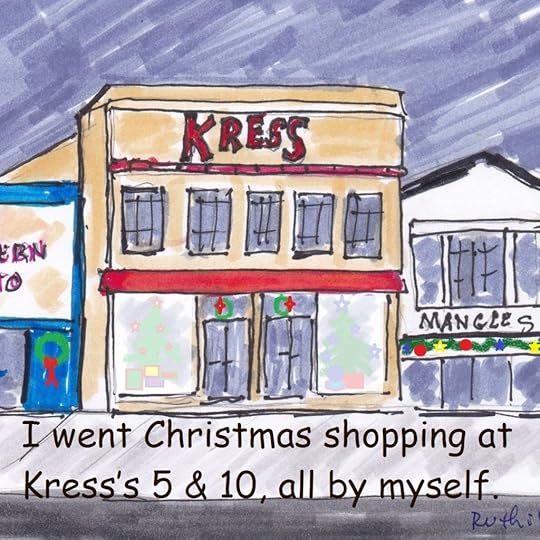
Kress’s was filled with treasures to sort through until I found the perfect gifts for everybody. I bought a fountain pen for Daddy, a little pin shaped like a flower for Grandmama, and the most magnificent red beads for Mama.
I had a dollar left and thought of the three old ladies who lived on our street. They were always so sweet to me, especially Mrs. Gates. I went looking for presents for them, and what wonderful presents I found! Way in the back of the store I found a bin filled with vases that looked like real cut-glass, and they only cost a dime apiece. Then I saw a rack filled with plastic roses. Perfect! For my dollar, I could get each lady a vase with two red roses. I was thrilled with my gifts and ran home to wrap them, anticipating everybody’s delight.
Now I sat on my bed looking at the ugliest package I ever saw. I’d started out with a beautiful picture in my mind of what the gift would look like, and this crumpled and tattered thing wasn’t it. I ripped off the paper, which wasn’t easy because it was pretty much covered by the tape that held it together. After more tries I gave up on my creative ideas and got the gifts presentable. I consoled myself, but realized the important thing was what was inside.
I put them under the tree and got ready for a Christmas ritual with my family that I treasured. After supper, we got into our old, brown and white Plymouth Savoy and drove to Mobile to look at the Christmas lights. On the way, comfortable in the warm car and excited about the spectacles we’d see, I told a string of silly kid jokes that kept Mama and Daddy laughing. These are some of my best memories.
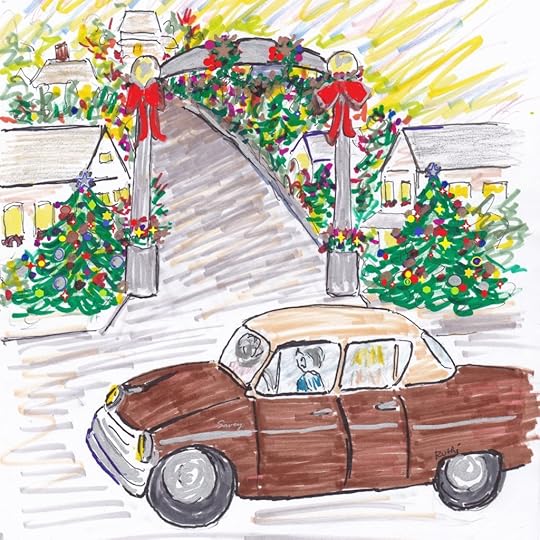
First, we went downtown to see the lights around Bienville Square, then we zig-zagged through the neighborhoods between Dauphin Street and Spring Hill Avenue. “Look! Look over there,” Mama squealed and pointed. Then, “Oh! Look at how they filled the yard with fairies. It’s a wonderland.” I pressed my face to the icy window and stared at the houses where I was sure only very rich people must live because they were big and so beautiful with dazzling Christmas lights. Even the entrances to the streets were lit up with lights, garlands, stars, and angels.
Christmas morning, we woke came into our living room that was colored by the lights on the tree and filled with the things Santa left, a Barbie doll in a red gown, a china tea set, and a Monopoly game. But I couldn’t wait to see their faces when my family opened their presents, and I wasn’t disappointed. Grandma put her pin right on her nightgown. Daddy said, “I’ll have to write a letter so I can use this fine pen.” Mama looked the most surprised when she saw the large red beads.
After breakfast, I went to see the ladies, bringing their presents. They were all surprised and happy. Then I got to Mrs. Gates house, where I learned the thrill of giving.
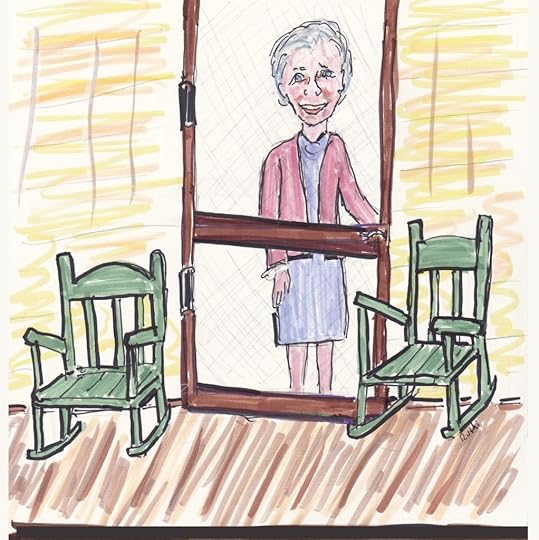
When she saw the vase with two plastic roses, you’d have thought it was a Cadillac car. She looked at it with awe. “Ooooh! Isn’t this the prettiest thing,” she crooned and hugged me.
Then she traced her finger over every angle of the vase, held it up to the light and exclaimed, “My! My! My! Look how it sparkles, just like crystal.” She took my little present and gave me the best gift in return.
Mrs. Gates didn’t stop there. Whenever I passed her and she was talking to neighbors, Mrs. Gates called out to me, and bragged that I was, “the best girl there ever was. Ruthi has never missed a Christmas. She always remembers the old folks and brings us a little something.” Even though I knew it wasn’t true, I loved her saying it.
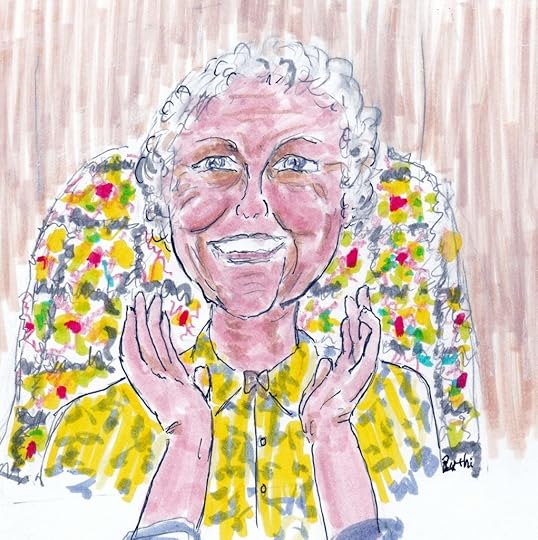
Mrs. Gates gave me the gift of appreciation and I wanted to be the girl she told everybody I was.
The post The Best Christmas Gift of Them All appeared first on How To Build A Piano Bench.



